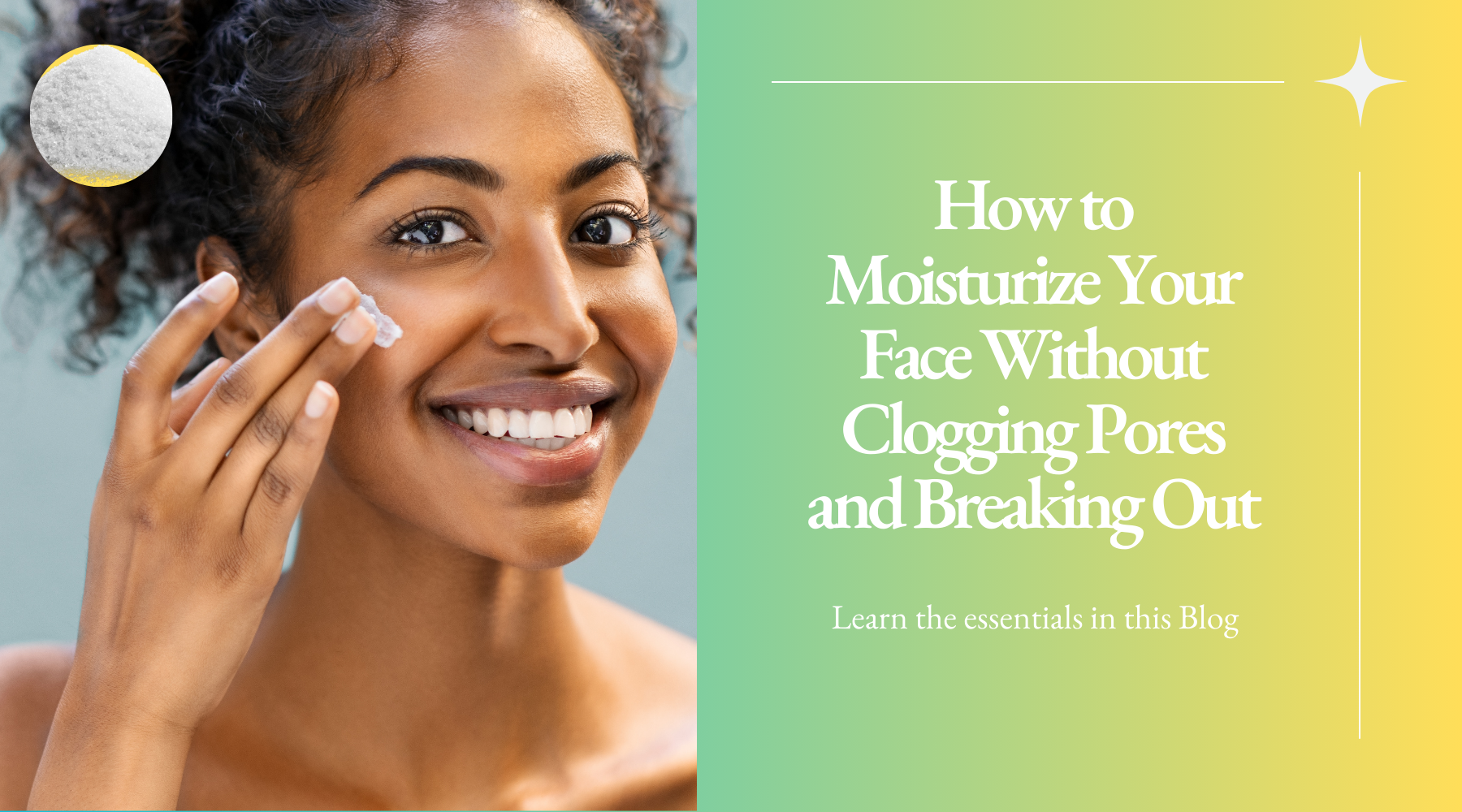
How to Moisturize Your Face Without Clogging Pores and Breaking Out
First, Let’s Understand the Connection Between Moisturizing and Breakouts
Have you ever heard the myth that moisturizing causes acne? It's time to debunk that misconception. In reality, proper hydration is crucial for maintaining a healthy skin barrier and preventing breakouts. The key lies in choosing the right products and understanding how moisturizers interact with your skin's natural oils.
Why Moisturizing is Essential for Healthy Skin
Imagine your skin as a protective shield. A well-moisturized skin barrier is stronger and better equipped to ward off external irritants, preventing dryness and the subsequent overproduction of sebum (oil). Without adequate hydration, your skin can become vulnerable to inflammation, flakiness, and premature aging.

The Common Misconceptions About Moisturizing Oily or Acne-Prone Skin
Many people with oily or acne-prone skin believe that moisturizing will worsen their condition. However, skipping moisturizer can actually make things worse. When your skin is deprived of hydration, it compensates by producing even more oil. This excess oil, combined with dead skin cells, can clog pores and lead to acne. The secret is to choose a moisturizer that is properly formulated to mimic a healthy skin barrier.
What Causes Clogged Pores and Breakouts?
Breakouts occur when pores become clogged with a mixture of oil, dead skin cells, and bacteria. Hormonal fluctuations, excess oil production, and improper skincare can all contribute to this. When pores are blocked, they create an environment where bacteria can thrive, leading to inflammation and the development of acne.
How Moisturizers Can Contribute to Clogged Pores
Not all moisturizers are created equal. Some contain heavy oils and comedogenic ingredients that can block pores, particularly in acne-prone individuals. Thick creams, rich in occlusives, can trap dirt and oil beneath the surface of the skin, leading to breakouts. This is why it's essential to choose non-comedogenic products that are formulated to hydrate without clogging pores.
How Can I Moisturize My Skin Without Clogging My Pores?
To keep your skin hydrated while avoiding clogged pores:
- Opt for lightweight, water-based moisturizers. These formulas provide hydration without leaving a greasy residue. While they do contain oils, they often have a low amount that doesn’t contribute to pore clogging and often signals to the skin to not overproduce.
- Always apply moisturizer to damp skin. This helps to lock in moisture and enhance active ingredient penetration.
- Be mindful of the amount used. Often, less is more.
- Always cleanse your skin before moisturizing. This ensures that dirt and oil don't get trapped.

Key Ingredients to Look for in a Non-Comedogenic Moisturizer
The Role of Humectants: Hydration Without Pore Clogging
These ingredients draw moisture from the air into your skin, making them ideal for oily or acne-prone skin. Ingredients like glycerin and sodium PCA draw moisture into the skin without causing congestion.
How Emollients Protect Your Skin Without Causing Breakouts
Emollients fill in the spaces between skin cells, creating a protective barrier that helps keep the skin hydrated without sealing off the pores. Lightweight emollients mimic the skin's natural oils, making them suitable for acne-prone skin. Emollients like panthenol and niacinamide soften and smooth the skin without a greasy finish, plus they help control and normalize oil production.
Why Occlusives Aren’t Always the Enemy for Acne-Prone Skin
While occlusives have a bad reputation in acne-prone skincare, they aren't always detrimental. When used sparingly, non-comedogenic occlusives can form a protective layer on the skin, preventing moisture loss without clogging pores.
Skin Science Decoded: Understanding The Skin 101

How Do I Moisturize My Face Without Breaking Out?
The best way to avoid breakouts while moisturizing is to choose products specifically formulated for all skin types. Opt for moisturizers that are lightweight and non-comedogenic. A good skincare routine, including gentle cleansing and exfoliation, also helps to keep breakouts at bay.
Avoiding Heavy, Oil-Based Moisturizers: What to Know
Heavy, oil-based moisturizers like butters and oil-only serums can suffocate acne-prone skin, leading to clogged pores and inflammation. As they are often too occlusive for skin prone to breakouts, opt for products with a lighter feel that still offer hydration without causing congestion. Some oil is okay, just not 100%.
How Often Should You Moisturize to Avoid Breakouts?
Moisturizing at least once a day is sufficient for most skin types. Over-moisturizing can lead to clogged pores, especially if you’re layering products unnecessarily. Stick to a balanced routine to keep your skin hydrated and free of breakouts.
Morning vs. Night time Moisturizing: What’s Best for Clear Skin?
In the morning, a lightweight sunscreen is ideal to protect against environmental stressors. At night, opt for a moisturizing formula to repair and hydrate the skin overnight. This dual approach ensures your skin stays moisturized around the clock without becoming oily or congested.
Science Backed Skincare Routine for Effortless Results

Maintaining a Moisturized Complexion Without Breakouts: Long-Term Tips for Success
Stick to a consistent skincare routine that includes moisturizing both morning and night. Avoid switching products too frequently, and focus on maintaining a healthy moisture barrier. When switching your routine, stay consistent for at least 3 months to see results.
Frequently Asked Questions: Moisturizing and Acne-Causing Ingredients
Can moisturizing worsen acne?
It depends on the moisturizer. Using a non-comedogenic product will help keep your skin hydrated without causing breakouts.
Should I avoid moisturizers with oils?
No. Oils are okay, just not too much. It is best to avoid oil-based serums and concentrated butters.
How often should I use a moisturizer if I have oily skin?
Once daily is ideal; some skin can handle twice a day. Just make sure to choose a lightweight, non-comedogenic formula, ideally balanced with actives that normalize oil production, such as niacinamide.
Learn More
Discover the ultimate solution for healthy, radiant skin with Lancolia’s Essence de Jeunesse face moisturizer. This lightweight, non-comedogenic formula is designed to hydrate, brighten, and nourish all skin types in one effortless step. Say goodbye to complicated routines—Essence de Jeunesse simplifies skincare without compromising results. Whether you're looking to moisturize, improve skin tone, or support a healthy complexion, this multi-benefit moisturizer delivers lasting hydration and a natural glow, all while keeping pores clear and skin balanced.
Ready to experience the transformation? Learn more about Essence de Jeunesse today!
References
Lio, Peter A., et al. "Non-comedogenic skincare products for acne-prone patients." Journal of Clinical and Aesthetic Dermatology, 2019.
Baumann, Leslie. "The science of skin barrier and moisturization." Dermatology and Therapy, 2020.
Draelos, Zoe Diana. "The role of emollients in maintaining the skin barrier." Journal of the American Academy of Dermatology, 2018.
Share
